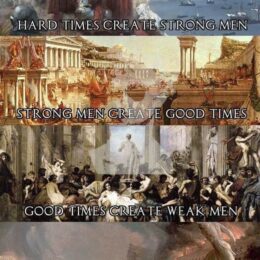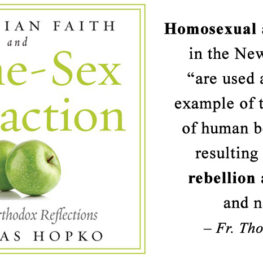LewRockwell.com Joseph Cardinal Ratzinger (Pope Benedict XVI)
[This is a homily that was delivered on 26 November 1981 in the course of a service for Catholic members of the Bundestag in the church of St. Wynfrith (Boniface) in Bonn. The readings provided for the day by the lectionary were 1 Peter 1:3-7 and John 14:1-6. At first sight they seemed to be out of keeping with the subject, but on closer inspection they showed themselves to be unexpectedly fruitful.]
The epistle and gospel that we have just listened to have their origin in a situation in which Christians were not citizens of a state who were able to shape their own lives but the persecuted victims of a cruel dictatorship. They could not share in responsibility for their state but simply had to endure it. It was not granted to them to shape it as a Christian state; instead their task was to live as Christians despite it. The names of two emperors in whose reigns tradition dates these two passages are enough to cast light on the situation: they were Nero and Domitian. Thus the first letter of Peter describes Christians as strangers within this state (1:1) and the state itself as Babylon (5:13). By doing so it indicates very impressively the political position that Christians were in; it corresponded more or less to that of the Jews living in exile in Babylon who were not responsible citizens of that state but subjects without any rights, and who thus had to learn how they might survive in it, not how they could build it up. Thus the political background of today’s readings is fundamentally different from ours. Nevertheless they contain three important statements which are significant for political activity among Christians.




Beware the visitations of the Ghosts of Conservative Republicans Past and their harsh warnings:
“However, on religious issues there can be little or no compromise. There is no position on which people are so immovable as their religious beliefs. There is no more powerful ally one can claim in a debate than Jesus Christ, or God, or Allah, or whatever one calls this supreme being. But like any powerful weapon, the use of God’s name on one’s behalf should be used sparingly. The religious factions that are growing throughout our land are not using their religious clout with wisdom. They are trying to force government leaders into following their position 100 percent. If you disagree with these religious groups on a particular moral issue, they complain, they threaten you with a loss of money or votes or both. I’m frankly sick and tired of the political preachers across this country telling me as a citizen that if I want to be a moral person, I must believe in ‘A,’ ‘B,’ ‘C,’ and ‘D.’ Just who do they think they are? And from where do they presume to claim the right to dictate their moral beliefs to me? And I am even more angry as a legislator who must endure the threats of every religious group who thinks it has some God-granted right to control my vote on every roll call in the Senate. I am warning them today: I will fight them every step of the way if they try to dictate their moral convictions to all Americans in the name of ‘conservatism.’
— Sen. Barry Goldwater (R)
http://en.wikiquote.org/wiki/Barry_Goldwater
Dictating Moral Beliefs or [Any other set of beliefs]
Barry Goldwater writes:
“They [religious zealots, according to Goldwater] are trying to force government leaders into following their position 100 percent. If you disagree with these religious groups on a particular moral issue, they complain, they threaten you with a loss of money or votes or both.”
Please note that every voter has EVERY right to contact his legislator. Every voter has EVERY right to ask his legislator to support a particular position. Every voter has the right to tell his legislator that he will not vote for him next time, if the legislator does not vote in favor of a particular piece of legislation.
If a voter does not act on his moral beliefs then exactly what should he act on?
Dean, isn’t it your MORAL beliefs that lead you to be concerned about Third World corruption that intervenes and diverts aid money meant for the poor. Such as the news that up to $550 million dollars in tsunami relief sent by the West to Indonesia has “mysteriously” disappeared. Why, of course, it is your intense moral sensibility that prompts you to call for the end of corrupt practices by Third World governments and of course, by that cesspool of corruption, the United Nations, which has shielded the Sudanese for years as they commit genocide and many other misdeeds.
Now, Dean, you’ve gone an confused me again.
In other threads here you complain that Pres. Bush was “violating the teachings of Christ” because he believes in letting taxpayers keep their own money and yet now you cite Sen. Barry Goldwater who said, ” I’m frankly sick and tired of the political preachers across this country telling me as a citizen that if I want to be a moral person, I must believe in ‘A,’ ‘B,’ ‘C,’ and ‘D.'”
So which is it? Are we supposed to listen to “political preachers” like you who tell us that Christ believed in taxing the rich to give to the poor. Or are we supposed to tell you, to quote Sen. Goldwater, “from where do [you] presume to claim the right to dictate [your] moral beliefs to [us]?”
Before you think you found conservative stick with which to beat conservatives over the head with, you might want to actually think about what it is you are quoting.
I find Goldwater’s comments a perfect example of the Dictatorship of Relativism the Benedict XVI so wisely warned us about in his Homily at the Mass for the Election of the Roman Pontiff.
Fr. Hans has linked Michael Novak’s article Culture in Crisis on the homepage of this blog (which you no doubt missed while on your way to assault us with Goldwater’s words). In that commentary you will find Novak taking ideas, like those expressed by Goldwater, to task:
“…the fact of human ?relativity? ? that is, the fact that we each see things differently, or that the life-voyage of each of us is unique and inimitable ? should not be transformed into an absolute moral principle. The fact of relativity does not logically lead to the principle of moral relativism.”
“No great, inspiring culture of the future can be built upon the moral principle of relativism. For at its bottom such a culture holds that nothing is better than anything else, and that all things are in themselves equally meaningless. Except for the fragments of faith (in progress, in compassion, in conscience, in hope) to which it still clings, illegitimately, such a culture teaches every one of its children that life is a tale told by an idiot, signifying nothing.”
That Sen. Goldwater wanted to play the Grand Game of “Sez’ Who!” when someone confronted him on a moral issues shows one reason why he failed to connect with most American voters. That and the wretched Daisy ad created by those enlightened, high-minded and noble Democrats.
We need to keep something in mind concerning the Goldwater quote. Alcohol prohibition, for example, was a religious crusade run by people who considered themselves ‘religious conservatives.’ The result was a massive increase in federal power at the expense of the states and civil society, and the creation of the Mafia as a force in the United States.
Whoops.
Today we think of the religious left as something of a joke. However, in the 1960’s and 1970’s, the mainstream churches hadn’t yet blown themselves up. At that time, there were many, many preachers and Theologians who were pushing for an ever bigger, more intrusive government to redistribute wealth and cure poverty.
There were equally popular preachers from the right pushing for an ever bigger, more powerful central government to combat communism and protect Israel.
Goldwater hated both sides with a passion. Much of what is on their agenda no self-respecting conservative could stomach. After all, here is another Goldwater quote, “Those who seek absolute power, even though they seek it to do what they regard as good, are simply demanding the right to enforce their own version of heaven on earth. And let me remind you, they are the very ones who always create the most hellish tyrannies. Absolute power does corrupt, and those who seek it must be suspect and must be opposed. Their mistaken course stems from false notions of equality, ladies and gentlemen. Equality, rightly understood, as our founding fathers understood it, leads to liberty and to the emancipation of creative differences. Wrongly understood, as it has been so tragically in our time, it leads first to conformity and then to despotism.”
Goldwater would have been equally suspicious of leftist Christians, rightist Christians, environmental whackos who worship the Earth, and all the other mix of dreamers who are interested in trying to fashion a Millenial kingdom. He just didn’t have that kind of overarching vision for using government power to solve all of life’s ills.
I do disagree with Goldwater on a number of issues. I don’t think, based on my reading of him, that he held religious faith very deeply, if at all. He certainly recognized a place for religion in public life, but I am not sure he found a place for it in his personal one.
That still doesn’t mean that I consider him to be a relatavist by any stretch. He had deeply ingrained principles for which he was willing to fight. After all, he is the man who said, “Extremism in defence of liberty is no vice.” Doesn’t seem terribly relativistic to me.
Some issues in politics do have a profoundly moral dimension. Abortion is one of them. Marriage is another. While these issues have been politicized, they are at heart moral questions about which Christian Orthodox teaching has been very clear, and very explicit. Issue such as these are not truly just political questions, but are really just societal expressions of Christian moral truths.
On the other hand, many Christian leftists and rightists attempt to make every single political issue a question of morality. That is wrong, purely and simply. Both sides, left and right, proclaim their idea as simply, “God’s way.”
One example of this is tax policy. The religious left claims only massive redistributive taxes are in keeping with Christian moral tradition. The right claims that limited taxes that allow people to keep more of their own earnings is God’s plan. The truth is taxes, spending bills, and a whole lot more besides are political questions. Christians can disagree over them and still remain in communion, but extremists on both sides try to paint even the most tangential issue as being a religious crusade.
Traditional conservatives tended to want to keep government limited so as to allow people to govern themselves at a local level. That prevents the implementation of grandiose plans at a national level (No Child Left Behind, for example.) That surely sounds good to me at this point.
Daniel, I highly recommend “The Cube and the Cathedral,” particularly as I read your response to Dean. You will find it highly valuable.
Dean, I suggest you read it as well. However, you have to shake the idea that whoever is most successful in morally impugning the opposition de-facto has the better arguments, in order to appreciate the real value of the book.
I wanted to pass this along. Pope Benedict is an extremely wise man, and he understands that the idea of a ‘divine state’ is still with us. The leftists worship the state, and see it and its power as a means to end poverty and cure all our ills.
The rightists have also fallen in love with the state, particularly in the United States. In December 2001 Rudy Giuliani delivered his last mayoral speech in St Paul’s Chapel, close to the site of the twin towers. “All that matters,” he claimed, “is that you embrace America and understand its ideals and what it’s all about. Abraham Lincoln used to say that the test of your Americanism was … how much you believed in America. Because we’re like a religion really. A secular religion.”
Giuliani isn’t alone in this faith. Lots of commentators on the right have noticed that Americans are speaking more and more of President Bush in religious tones that befit a Pope more than a politician. At the same time, rhetoric that was once reserved for the church and her mission have been increasingly applied to the United States.
The left and its vision of the state was the major problem in 1981. I think Pope Benedict would update homily today somewhat to remind us that people who consider themselves good Christians can also fall into the trap of state-worship.
I’m not sure what to make of this sermon. It seems he’s saying that the State cannot create virtue, only punish its absence and so we should not expect a utopian society contrived through government regulations. It seems a logical conclusion would thus be that the only laws we should create are laws to prohibit acts where the danger or harm to the general populations outweighs the “harm” done by restricting various individual freedoms through forbidding those actions.
This doesn’t square with the goals of many of the groups who are interested in removing anything subjectively “indecent” from television, radio, etc. Same thing with “hate speech” laws, incidentally. Yet government regulation on personal decisions or speech seems to be the rage among a few more conservative groups.
Perhaps I’m rambling …
Number 5. Father: Thank you for the book recommndation; I will order it from the library. If by secularism we mean a loss of spirituality, alienation from God’s love, and ignorance of the ethical framework provided by religion than I certainly agree that this is a very ominous trend. One could argue that the loss of religious values in Europe during the late 19th century set the stage for the rise of Hitler and Stalin in the 20th.
Here is the book I just finished reading, and would like to recommend:
“The Battle For God”, by Karen Armstrong. Here is a review: http://www.americamagazine.org/BookReview.cfm?articleTypeID=31&textID=768&issueID=307
The Battle for God has a lot of good history of Christianity, Judaism and Islam and discussses some parallel trends in all three. It also provides a good model for understanding the tension between religion and science.
“Her book makes an attempt to understand the development of fundamentalism throughout the history of Judaism, Christianity and Islam. It explores the reasons for its many successes, with the goal of finding ways of dealing with it. She maintains that as a global response to the modern secularist culture, fundamentalism cannot be ignored or dismissed as an innocuous passing fad.
.. she shows how Jews, Christians and Muslims were faced with different social and cultural problems and how they responded to the pressures of the times. She explains how the persecution of the Jews by the Inquisition led to various reactions, including the developing of a new mythology; how the Islamic empires of the period maintained a conservative spirit; and how the Christian world developed a modern rationalistic attitude that was opposed to faith.”
—————————————————————-
I hope everyone has a Good Holy Week. God bless you all.
Note 8. Dean, you define secularism as being “a loss of spirituality, alienation from God�s love, and ignorance of the ethical framework provided by religion.” This is a good start, but in fact these things are symptoms of secularism’s spread, not root causes. For the causes themselves, one must dig deeper… or read Wiegel, who has done the digging for his readers (this is really just an addendum to Fr. Hans’ recommendation).
A blessed Holy Week to you and to all. “Be not afraid, for I have conquered the world.”